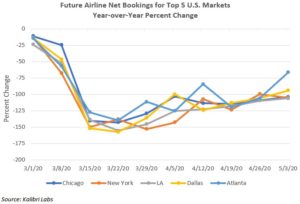Hotels at Secondary and Tertiary Airports Will Suffer Longer – by Jenny Lee
The coronavirus pandemic’s impact on travel is thought to be six or seven times greater than the 9/11 attacks, according to the U.S. Travel Association. Air travel volume fell precipitously through March. The estimated revenue losses by air carriers in 2020 is at least $252 billion. In late March, domestic carriers received a $60 billion bail-out, with some strings attached.
The Department of Transportation issued an order that carriers receiving financial assistance under the Coronavirus Aid, Recovery, and Economic Security Act (the CARES Act) are required to maintain minimum air service to all destinations served as of the last week of February (with some exceptions).
The Show Cause Order stated that in cases where multiple airports serve the same point, covered carriers would not need to maintain service to all airports but would be able to consolidate operations at a single airport serving the point. Due to this caveat, we believe that airport hotels at secondary and tertiary markets will have their occupancies severely impacted and will be among the last to come back.
For example, with flight consolidations at Los Angeles International Airport (LAX), the Burbank, Long Beach and Ontario airports will probably suffer. The same is predicted for San Jose and Oakland airports after consolidating at San Francisco International Airport (SFO). Other secondary and tertiary airports likely to be affected include Dallas’ Love Field and Chicago-Midway, among others.
The definition of “same destination” is being stretched. Despite taking the bail-out:
- Delta has asked to suspend service in Melbourne FL; Brunswick GA; Pocatello ID; Worcester MA; Flint, Kalamazoo and Lansing MI; and Hilton Head, SC;
- United had earlier tried, unsuccessfully to suspend service to Kalamazoo MI, Santa Fe NM and Green Bay Wisconsin.
Frontier, Jet Blue, and Spirit, which are under a slightly different set of rules, are asking for waivers for bigger cuts:
- On April 27, Frontier received waivers for suspending service to Detroit, Charlotte and the Boston area. Frontier had originally asked approval to suspend service to 33 U.S. airports through June 10, but only three locations were granted.
- JetBlue has asked to halt flights to 16 U.S. airports, including Chicago, Atlanta, Houston, Seattle, Las Vegas, Philadelphia, Dallas and Detroit through September 30.
- Spirit has asked for approval to suspend flights to Charlotte, North Carolina, Denver, Minneapolis/St. Paul, Seattle, Portland and Phoenix.
It is uncertain at this time how many waivers the Department of Transportation will issue but as more markets consolidate, the hotels in secondary and tertiary markets will surely be impacted.
The Service Obligation pertains to only U.S. destinations and is scheduled to extend through September 30, 2020, the same date under the CARES Act through which carriers must maintain certain levels of employment. This date may be extended to a later time, for all or portions of covered carriers and covered points.
The latest surveys indicate that air travel, in particular, will be challenged. In recent research for the U.S. Travel Association, 67% of respondents indicated they would take a trip by car in the next 6 months, but only 32% said they would take a domestic flight within that window. International travel was even lower, at only 19% of the respondents planning an international flight within the next 6 months.
Future airline net bookings dropped significantly in the nation over the past few months. According to Kalibri Labs and Forward Keys, airline net bookings through December 2020 in the U.S. hit a low of negative 173.0% for the week of March 16 to March 22 compared to same period last year. The outlook is still grim with negative 107.8% net bookings for the week of April 27 to May 3. Week-over-week overview of net booking trends (including cancellations) for major U.S. destinations through December 2020 is shown below:
Click on image to enlarge.
Most analysts believe that the industry will recover by the year 2022, at the latest. But until vaccines and drug treatments are developed, airport hotels, especially those located in the secondary and tertiary markets, will be on a long road to recovery and among the last to recover.


